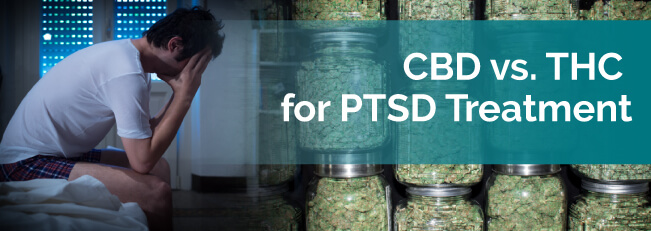
More and more people with post-traumatic stress disorder are looking for effective therapies. When psychotherapy and other medications fail, patients are turning to medical marijuana to treat their condition.
Cannabis is legal for medical purposes in several states, and the industry is booming. Growers produce strains that feature fine-tuned cannabinoid content that’s been shown to treat specific conditions and symptoms.
PTSD is not a qualifying condition for marijuana use in all medically-legal states, but more and more physicians are viewing it as a legitimate treatment option. Today’s patients, doctors and dispensary professionals are now attempting to determine which strains best treat PTSD.
Some believe products high in THC (tetrahydrocannabinol) are the best option. Others shy away from this cannabinoid and believe that CBD (cannabidiol) is the only way to go. If you’re looking for medical marijuana treatments for PTSD, you’ll need to make an informed choice when looking at the THC and CBD contents of medical cannabis.
Among those who have witnessed the healing properties of medical marijuana, there’s a debate over THC. It’s the cannabinoid compound in marijuana directly responsible for the psychotropic side effects. CBD on the other hand, provides many of the healing properties of cannabis without the high.
CBD has many medicinal benefits, including the following:
The reason THC hasn’t been done away with in the medical marijuana industry is because it contains additional healing qualities, such as. For patients suffering from a debilitating medical condition, THC:
Post-traumatic stress disorder is basically the inability to fully recover after a traumatic event. Those with the condition continue to struggle with flashbacks, anxiety and other emotional and psychological symptoms.
The question has always been: Why do PTSD patients struggle with traumatic events, while others can recover naturally? The answer may lie in our endocannabinoid system. This system is made up of cannabinoid receptors responsible for our perception of sensations and bridging our mind and body. Its main job is to bring order, but sometimes medical conditions cause it to become imbalanced.
PTSD patients have low levels of anandamide, a molecule that binds itself to cannabinoid receptors and activates them. When working properly, this helps people deal with pain, depression and memories. Because they lack anandamide molecules, PTSD patients have a harder time dealing with painful memories and feelings of anxiety.
The cannabinoids in cannabis, specifically THC and CBD, act much like anandamide by clinging to active cannabinoid receptors. The result is reduced anxiety and the ability to quell unwanted memories.
Medical marijuana treatments are far different than weed you buy on the streets. Because they’re strictly regulated by each state’s medical marijuana program, their chemical makeup is tested before they’re sold at local dispensaries. That means you can choose whether you want a medication with a higher THC or CBD content.
THC can increase feelings of anxiety or paranoia in users, so many believe it’s not a safe or effective treatment for PTSD. CBD has the opposite effect. It’s been shown to reduce feelings of anxiety in those with phobias or anxiety disorders. It also stifles fear memory, allowing patients to let go of apprehensions.
But many believe THC has benefits for PTSD patients, as well. The THC compound targets the exact same receptors as anandamide, so it may be the chemical component that’s key to balancing the endocannabinoid system in PTSD patients. And with the right balance of THC content, the calming effects of CBD are shown to last longer, allowing for extended relief.
Whatever you choose, be sure to consult your medical marijuana doctor. Your physician can recommend treatment options and dosages. They’ll also monitor how you react to different medications. Results vary between individuals, so it’s important to keep your doctor in the loop.